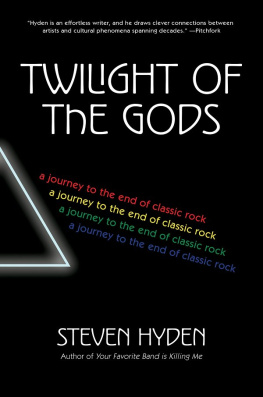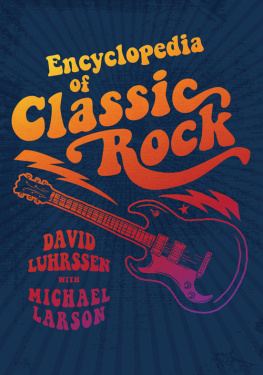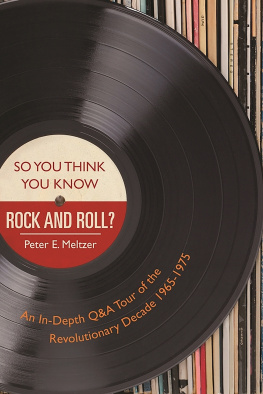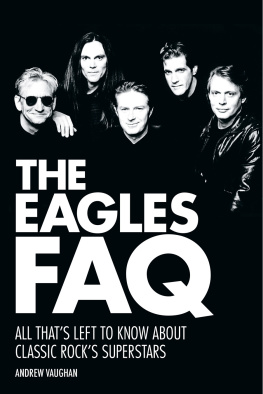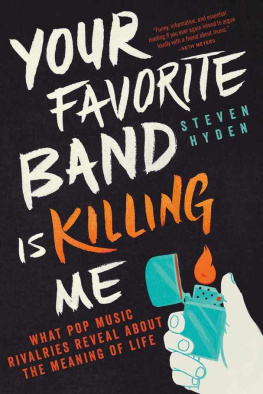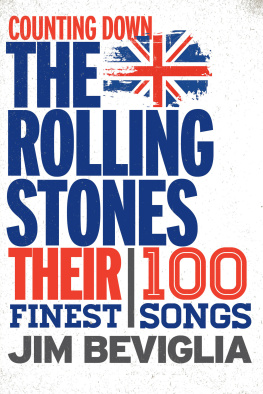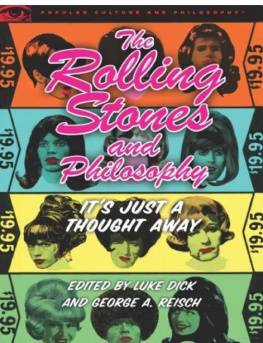For Stan at New Frontier Record Exchange, and all the other legendary rockers who died too soon; and Rosemary, who was born right on time
Ray: Everythings going to flame, man, the planet is screaming for change! Weve got to make the myths.
Jim: There ought to be orgies.
from J. Randal Johnson and Oliver Stones screenplay for The Doors
Ive always had this skepticism about rock, because I worshipped it and believed in it for so long, the mythology of rock n roll, and I got to a certain point in my life where there are people making up stuff about me and what I supposedly did as a singer in some band.
Jeff Tweedy
I dont want to live in a world without lions, and without people who are lions.
Werner Herzog
Contents
Side 1
The Hero Is Born and Learns About the World...
Track 1
The Song Is Over
Notes on Track 1: The tone setter. We wanted the opening track to sum up our aesthetic and overall ethos. So we stated our core themes plainly in the lyricsthe power of rock, the inevitability of death, and the struggle to reconcile those two things. Oh, and Don Henley sucks.
For as long as I can remember, classic rock has been there for me.
Led Zeppelin, Pink Floyd, the Beatles, the Stones, Dylan, Springsteen, Neil Young, the Who, Black Sabbath, AC/DC, David Bowiethe fixtures of my classic-rock youth. But like all precious minerals, classic rock is a finite resource. One day, it will disappear. Bands break up. Albums go unplayed and are eventually forgotten. Legends die. But it still seems... unfathomable. For much of my life, I thought that classic rock would be around forever.
I remember when the reality of classic rocks mortality first dawned on me. It was 2012, and I was sitting inside of an arena on the outskirts of Chicago waiting for the Who to come onstage. When I say the Who, Im referring to half of the WhoPete Townshend and Roger Daltrey. The other two guys, Keith Moon and John Entwistle, were long dead. Moon died exactly one year after I was bornSeptember 7, 1978from overdosing on pills prescribed to help him stave off his craving for alcohol. (This is the most ironic death in rock history.) Entwistle passed away in 2002, one month before I saw the Who in concert for the first time. Entwistles death was more typical for a rock starhe was found in a Las Vegas hotel room, where he had been partying with a stripper named Alycen. In life, Entwistles nickname was the Quiet One, which I guess is ironic given his final moments.
Before my first Who concert in 02, I was bummed that I would never get to see the Who with Entwistle. I briefly considered not goingthe purist in me wondered whether I was seeing the real Who. But what did I know about the real Who anyway? I started listening to classic rock as a teenager in the nineties, when many of my favorite bands had long since broken up, died, or devolved into tribute acts. But in my mind, the greatest rock bands the world has ever known were eternally frozen in their primes. To me, the Who was still the band on the cover of Whos Next.
Sure enough, my reservations about seeing the Who without its original bassist and drummer disappeared approximately 1.2 seconds into the opening number, I Cant Explain. I was in awe of my heroes.
Loving classic rock has always been an act of faith: albums as sacred texts, live concerts as quasireligious rituals, and rock mythology as a means of self-discovery. After discovering classic rock at the dawn of middle school, I committed myself to studying rock scriptureI read all of the books, subscribed to all of the magazines, and watched all of the documentaries. I sought out the most crucial LPs of the rock canon and played them over and over until the lyrics became my personal ethos. I loved the guitar riffs, the bombastic drums, the preening vocals. But what made classic rock an obsession for me was the belief that I was plugging into something profound and larger than life. Im not a religious person, but if there is a God, I was sure I had found Him on side two of Abbey Road.
The mythology is what hooked me. Some kids read comic books; others glamorize athletes. My superheroes were rock stars who either had been deceased for decades or were well ensconced in the throes of middle age by the time I discovered them. But I didnt carethat just made my classic-rock heroes all the more mythic. I worshipped Pete Townshend, Bob Dylan, Keith Richards, Jimmy Page, Jim Morrison, and Paul McCartney because they were distant, untouchable figures. They were like gods who I secretly believed could elevate my own humdrum existence if I had enough faith in the classic-rock mythos.
Of course, those people werent gods at all, but rather mortals who would grow old, make comeback records with Don Was and/or Jeff Lynne, and take money from beer companies for their overpriced, nostalgia-driven concert tours. For a while I was able to overlook these realities and fixate on the myth. But that night in 2012, inside of the hockey arena outside of Chicago, my faith in classic rock couldnt completely blot out the truth.
Ill say this first: I thought the Who was incredible. How could the Who not be incredible? For this tour, they performed one of my favorite albums, 1973s Quadrophenia, in its entirety. Playing iconic albums in their entirety has become standard practice for classic-rock bands. The days of forcing the audience to listen to three or four songs from a well-intentioned but mostly lousy late-career album nobody cares about are basically over; time is precious, and classic-rock tours now are all about the hits.
On the way to the show, I passed the outlet mall where Id bought Quadrophenia on cassette more than twenty years earlier, when I was in the eighth grade. A double-album rock opera about an alienated teenager who suffers from multiple personality disorder, Quadrophenia should be issued free of charge to every fourteen-year-old misfit. I used to slap the tape in my Walkman and listen to Cut My Hair over and overPete Townshend sings in the chorus about working yourself to death just to fit in, just like I was doing, as Keith Moons frantic drums replicate the erratic pounding of a broken teenage heart.
Onstage in Chicago, the Who labored to re-create an essential listening experience from my youth. During The Real Me, Daltrey twirled his microphone in precisely the manner I had always imagined him twirling his microphone. Then Townshend attacked his guitar during the suicidal rocker Drowned, bashing out his solo with about a dozen violent windmills. These guys were still extremely good at being the Who. I loved it.
However, I was keenly aware that my enjoyment hinged on the ability to project an image onto the Who that no longer seemed wholly accurate. Despite their best efforts, Townshend and Daltrey seemed old. Like... really fucking old. Thats because they were really fucking oldthey tallied 135 years between them. Townshends pallor was alarming; he looked like a guy who had just read the reviews for All the Best Cowboys Have Chinese Eyes for the first time. And then there was Daltrey, who I estimated had lost at least 75 percent of his once-mighty singing voice. When he tried to scream his iconic yelp at the climax of Wont Get Fooled Again, he sounded like granddad hacking the gunk out of his throat.
Throughout the concert, video footage of the Who from the sixties and seventies flashed on the screens behind Townshend and Daltrey. Even the dead guys made cameosEntwistle appeared on-screen to play a bass solo during 5:15, and Moon contributed vocals culled from a midseventies festival gig for his loony showcase, Bell Boy. Seeing the Who in person was not unlike watching my DVD copy of

